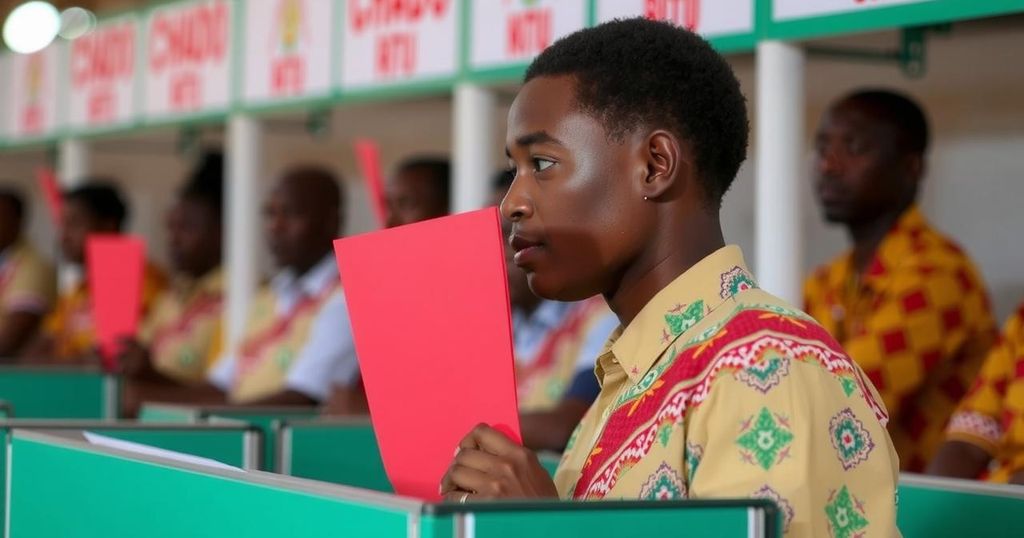Chad’s First Parliamentary Elections in Over a Decade: A Turning Point for Democracy?

Chad holds its first parliamentary elections in over ten years amid skepticism from opposition parties, claiming governmental repression and illegitimacy of the electoral process. With over 1,100 candidates vying for 188 parliamentary seats, the elections mark the end of a three-year transitional period following former leader Idriss Deby’s death. Security challenges and restrictions on the media further complicate the electoral landscape.
Chad has embarked on its first parliamentary elections in over ten years, marking a significant phase in the country’s shift from military to civilian governance. Voter participation includes 8.3 million registered individuals choosing from over 1,100 candidates competing for seats in the 188-member parliament. This election follows the death of long-time president Idriss Deby in 2021 and the subsequent rule of his son Mahamat Idriss Deby. Opposition groups have expressed skepticism about the legitimacy of the electoral process, claiming governmental repression and denouncing the elections as a mere facade for consolidating power.
The voting day serves as an official conclusion to a three-year transitional period set in motion post-Deby’s death, yet many political parties are opting to boycott the electoral process. They accuse the ruling Patriotic Salvation Movement (MPS) of creating a political dynasty rather than fostering genuine democracy. This electoral contest occurs under considerable security threats from regional conflicts, such as unrest in Sudan and attacks by Boko Haram, alongside a recent military cooperation termination with France.
The last parliamentary elections were conducted in 2011, with the ensuing years characterized by indefinite postponements and a lack of funds. Economic hardships have plagued the nation, making it one of the poorest in Africa despite its oil production capabilities. The postponed elections were initially rescheduled for 2020 but were derailed by the COVID-19 pandemic. Following increased civil unrest, characterized by protests against governmental power, the military established the Transitional Military Council to navigate the transition.
Credibility concerns have been amplified as significant opposition figures, including the leader of the Transformers Party, have denounced participation in the election under the current conditions. The urgency from the ruling government to proceed with the elections without full opposition involvement has roused critiques, with human rights organizations insisting on the need for a fair and inclusive electoral process. Further compounding these issues are restrictions imposed on journalists covering the elections, curtailing their ability to report freely and constructively on the electoral landscape.
As voting approaches, analysts project that the governing MPS is likely to secure a significant electoral victory, reinforcing its longstanding dominance and solidifying the Deby family’s grip on political power. The overarching sentiment among rights groups emphasizes the necessity for thorough oversight of the election process, ensuring that it aligns with principles of fairness and inclusivity across a politically beleaguered landscape.
The parliamentary elections in Chad are pivotal as they coincide with significant political transformations following the death of Idriss Deby in 2021. His son Mahamat Idriss Deby ascended to power amidst a chaotic transition, halting previous electoral processes for over a decade. Opposition parties are now calling the elections into question, reflecting a deeper concern regarding the legitimacy and democracy within the state. Moreover, the geopolitical context, marked by regional instability and economic struggles, adds complexity to the electoral framework. The atmosphere is further dampened by independent civil society’s role in monitoring electoral integrity amid governmental repression and boycotting efforts by various parties.
In conclusion, Chad’s first parliamentary elections in over ten years signify a critical moment in its journey toward democracy, amidst widespread skepticism regarding legitimacy and fairness. The ongoing protests and boycotts from opposition parties highlight the prevailing tensions within the political fabric, while regional security challenges exacerbate the situation. Without full opposition participation, questions about the credibility of the electoral process loom large, prompting national and international observers to call for inclusivity and fair practices moving forward.
Original Source: www.aljazeera.com







